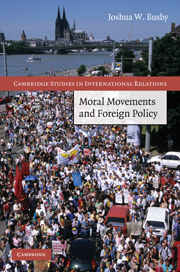Book contents
- Frontmatter
- Contents
- List of figures
- List of tables
- Acknowledgments
- 1 States of grace
- 2 Movement success and state acceptance of normative commitments
- 3 Bono made Jesse Helms cry: Jubilee 2000 and the campaign for developing country debt relief
- 4 Climate change: the hardest problem in the world
- 5 From God's mouth: messenger effects and donor responses to HIV/AIDS
- 6 The search for justice and the International Criminal Court
- 7 Conclusions and the future of principled advocacy
- Bibliography
- Index
- Cambridge Studies in International Relations
6 - The search for justice and the International Criminal Court
Published online by Cambridge University Press: 04 August 2010
- Frontmatter
- Contents
- List of figures
- List of tables
- Acknowledgments
- 1 States of grace
- 2 Movement success and state acceptance of normative commitments
- 3 Bono made Jesse Helms cry: Jubilee 2000 and the campaign for developing country debt relief
- 4 Climate change: the hardest problem in the world
- 5 From God's mouth: messenger effects and donor responses to HIV/AIDS
- 6 The search for justice and the International Criminal Court
- 7 Conclusions and the future of principled advocacy
- Bibliography
- Index
- Cambridge Studies in International Relations
Summary
In February 2006, Luis Moreno-Ocampo, the prosecutor of the International Criminal Court (ICC), issued a letter acknowledging that he had received more than 240 communications alleging among other things that war crimes had been committed in and after the March 2003 invasion of Iraq. The ICC was a young institution, having been created in July 2002, when its founding treaty entered into force. The Court was charged to address “the most serious crimes of international concern,” focusing on the crimes of individuals rather than states, looking specifically at genocide, crimes against humanity, and war crimes. In his reply to the complainants, Moreno-Ocampo declined to begin a formal investigation of the charges. He noted that his office had no authority to comment on the legality of the conflict, as the rules for crimes of aggression had yet to be codified: “As the Prosecutor of the International Criminal Court, I do not have the mandate to address the arguments on the legality of the use of force or the crime of aggression.” As for war crimes, Moreno-Ocampo noted that the Court's jurisdiction did not extend to non-parties (like the United States); he did evaluate whether parties to the statute (such as the United Kingdom) had been complicit in committing war crimes. The prosecutor demurred, suggesting any crimes committed were not of sufficient gravity to warrant the Court's jurisdiction: “The resulting information did not allow for the conclusion that there was a reasonable basis to believe that a clearly excessive attack within the jurisdiction of the Court had been committed.
- Type
- Chapter
- Information
- Moral Movements and Foreign Policy , pp. 210 - 254Publisher: Cambridge University PressPrint publication year: 2010



